Advice from 2025 Commencement Speeches
Today’s Tuesday Reading is from Jim Bruce, Senior Fellow and Executive Coach at MOR Associates, and Professor of Electrical Engineering, Emeritus, and CIO, Emeritus, at the Massachusetts Institute of Technology, Cambridge, MA. Jim may be reached at [email protected] or via LinkedIn.
Beginning in mid-May each year, this country’s some 4,000 colleges and universities hold commencement exercises. This year, over one million undergraduates and half a million post-graduates will have been awarded degrees by their institutions. At each of these graduation ceremonies, one or more speakers will offer their wisdom, which they hope the graduates may find helpful in their selected careers, no matter where their journey might take them. Here is some of the advice from 2025 commencement speeches that caught my attention:
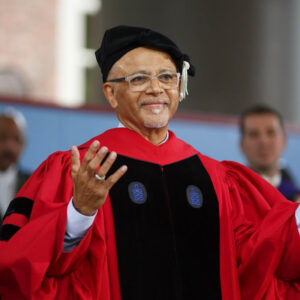
Abraham Verghese
Linda R. Meier and Joan F. Lane Provostial Professor of Medicine, Vice Chair for the Theory & Practice of Medicine, and Internal Medicine Clerkship Director at Stanford University Medical School, immigrant, and best-selling author.
Speaking at Harvard University’s Commencement, Verghese said “the decisions you will make in the future under pressure will say something about your character, while they also shape and transform you in unexpected ways. Make your decisions worthy of those who supported, nurtured, and sacrificed for you… and above all, make good use of your time.” Full transcript.
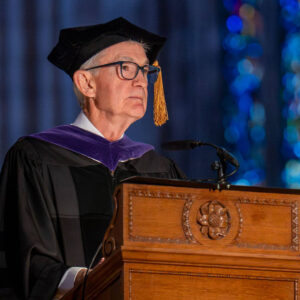
Jerome H. Powell
Chair of the U.S. Federal Reserve
Powell spoke at Princeton University Commencement. He talked about his undergraduate years at Princeton, admitting that he did not make the best use of that time that he could have.
Fifty years later, he noted that he could tell you something he did not know then: The vast majority of what you need to know about work, about relationships, about yourself, about life, you have yet to learn. And that itself is a tremendous gift. Over the remainder of your life, you can—you must—continue to educate yourself and to grow as a person, becoming more focused on what really matters, more widely knowledgeable, better read, more disciplined, and more strategic. But also wiser, kinder, more empathetic, more generous, more loving, more forgiving of others and of yourself. Each of us is a work in progress. The possibilities for self-improvement are limitless.
Another thing he noted learning along the way: as you strive to reach your full potential, you will need to take risks and make mistakes. Everyone makes mistakes. Take it from an expert! But the bigger mistake is to avoid taking risks.
A last and critical point. Your life matters—to the people you love and to the world at large. Fifty years from now, your integrity is all you have. Guard it carefully. Full transcript.
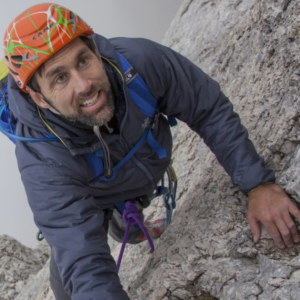
Erik Weihenmayer
Adventurer and author. He is best known for being the first blind person to solo Mount Everest and the only blind person to ascend the Seven Summits.
In his Commencement speech at the University of Arizona, he said, “One of my greatest rewards is to be able to share a message of possibility, especially with young people as they shape the vision that will be the foundation of their lives.”
A life of adventuring has helped Weihenmayer realize that there are three types of people in this world: Quitters, campers, and climbers. Weihenmayer is a climber. He didn’t waste any time in his speech talking about quitters, since there weren’t any in attendance. Campers, he said, start out climbing with excitement and hope but lose belief in themselves as they encounter adversity.
“Climbers are a rare group, and if I could see, I’d be looking at a lot of climbers out here. These are people who continue to figure out a way to grow and evolve and explore and challenge themselves every day of their lives until the day they die.”
But Weihenmayer also relates to the campers. When he became blind from a rare eye disease in middle school, he despaired about the help he needed to get around and about the joy he could hear his classmates having without him. “Going blind was scary, but not fully living – well, that was terrifying… Climbers understand that life is an ongoing, never-ending process of reaching out to the darkness when we don’t know what we’ll find.” Full speech.
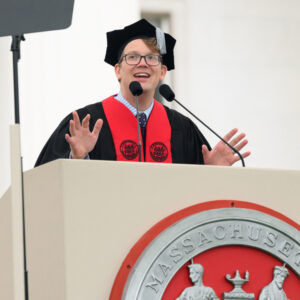
Hank Green
Prolific digital content creator
MIT President Sally Kornbluth noted that many MIT students are captivated by CrashCourse and the way Green makes learning about complex science subjects accessible and fun. Green says, “If I could attribute my success, whatever it is, to anything besides luck, it’s that I literally can’t stop believing that there is any better use of time than learning something new.”
“And curiosity doesn’t just expand the number of tools you have and how well you’re able to use them, it expands your understanding of the problem space. And so maybe the advice is very simple. Just be curious about the world and you’ll have everything you need for the future and, look, it is almost that simple.” Full transcript.
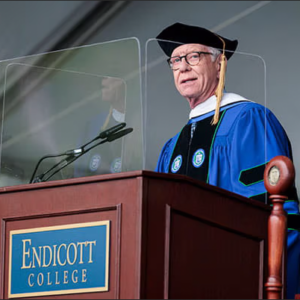
Sully Sullenberger
Retired aircraft pilot, best known as the captain of US Airways Flight 154 when, after a bird strike, he successfully landed his aircraft on the Hudson River with no loss of life among the 155 people on board.
At Endicott College, he told graduates: “The truth is that no one of us knows what tomorrow may bring. Yet each of us has a responsibility to prepare ourselves for whatever may come. Whether it’s a crisis or an opportunity – if you aren’t prepared, you won’t meet your moment…Part of your education, your preparation, is to know how to handle change, especially as the pace of change globally accelerates and we now face huge challenges. We must be capable of independent critical thought, and when we make important decisions, we must take them based on facts, not fears or falsehoods.
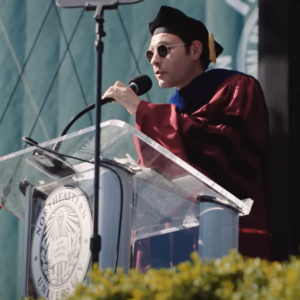
Elliot Grange
Entrepreneur and record executive, one of the student speakers at Northeastern University’s commencement.
He told the audience “I’m here to tell you the two greatest things people have said to me: ’That’s impossible’ and ‘no’…In truth, there is very little in life we control. But, we can choose how we show up. You represent …. The future we haven’t seen, a future we can’t fully imagine, and won’t truly understand, until you build it. Each and every one of you were raised on speed, technology, and constant evolution. You shape culture, technology, business, and politics in ways we can’t yet fathom.” Full speech.
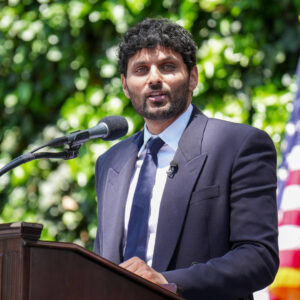
Jay Shetty
Best-selling author, an award-winning podcast host of On Purpose, purpose-driven entrepreneur and a former monk.
He spoke at Princeton University. Early in his remarks, Shetly noted that he had three choices growing up as an Indian immigrant and he choose monk. His parents were not happy and sent him to the TED Talk Why We Make Bad Decisions. So, when he was invited to speak at Princeton, his immediate thought was “I hope that I say something worthy of their time.” Self-doubt. The script of his speech provides a path to eliminate, or at least significantly reduce, your self-doubt.
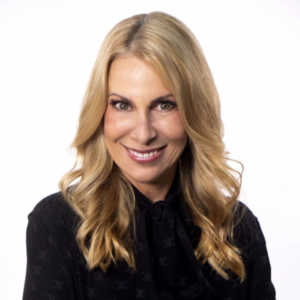
Jessica Sibley
Chief Executive Officer of Time
“Careers are marathons, not sprints. Take the long view. Pace yourself. And as you move forward, I encourage you to find and embrace grit, grind, and glam. Most days, your job will demand one of these; on a good day, maybe all three.”
The advice from 2025 commencement speeches offers many important lessons. I’ve picked one that I am personally going to work on in the coming weeks. I would encourage you to do so as well.
I trust that you will have a wonderful summer. . . . . . . . . jim
Be sure you are subscribed to our Tuesday Reading series by signing up here.
- December 2025 (3)
- November 2025 (5)
- October 2025 (5)
- September 2025 (5)
- August 2025 (7)
- July 2025 (5)
- June 2025 (4)
- May 2025 (5)
- April 2025 (5)
- March 2025 (4)
- February 2025 (4)
- January 2025 (4)
- December 2024 (3)
- November 2024 (4)
- October 2024 (5)
- September 2024 (4)
- August 2024 (4)
- July 2024 (5)
- June 2024 (5)
- May 2024 (4)
- April 2024 (5)
- March 2024 (5)
- February 2024 (4)
- January 2024 (6)
- December 2023 (3)
- November 2023 (4)
- October 2023 (5)
- September 2023 (4)
- August 2023 (4)
- July 2023 (4)
- June 2023 (4)
- May 2023 (5)
- April 2023 (4)
- March 2023 (1)
- February 2023 (1)
- January 2023 (4)
- December 2022 (3)
- November 2022 (6)
- October 2022 (4)
- September 2022 (4)
- August 2022 (6)
- July 2022 (4)
- June 2022 (4)
- May 2022 (5)
- April 2022 (4)
- March 2022 (4)
- February 2022 (3)
- January 2022 (4)
- December 2021 (3)
- November 2021 (4)
- October 2021 (3)
- September 2021 (4)
- August 2021 (4)
- July 2021 (4)
- June 2021 (4)
- May 2021 (4)
- April 2021 (4)
- March 2021 (5)
- February 2021 (4)
- January 2021 (4)
- December 2020 (4)
- November 2020 (4)
- October 2020 (6)
- September 2020 (5)
- August 2020 (4)
- July 2020 (7)
- June 2020 (7)
- May 2020 (5)
- April 2020 (4)
- March 2020 (5)
- February 2020 (4)
- January 2020 (4)
- December 2019 (2)
- November 2019 (4)
- October 2019 (4)
- September 2019 (3)
- August 2019 (3)
- July 2019 (2)
- June 2019 (4)
- May 2019 (3)
- April 2019 (5)
- March 2019 (4)
- February 2019 (3)
- January 2019 (5)
- December 2018 (2)
- November 2018 (4)
- October 2018 (5)
- September 2018 (3)
- August 2018 (3)
- July 2018 (4)
- June 2018 (4)
- May 2018 (5)
- April 2018 (4)
- March 2018 (5)
- February 2018 (5)
- January 2018 (3)
- December 2017 (3)
- November 2017 (3)
- October 2017 (5)
- September 2017 (3)
- August 2017 (5)
- July 2017 (3)
- June 2017 (8)
- May 2017 (5)
- April 2017 (4)
- March 2017 (4)
- February 2017 (4)
- January 2017 (4)
- December 2016 (2)
- November 2016 (7)
- October 2016 (5)
- September 2016 (8)
- August 2016 (5)
- July 2016 (4)
- June 2016 (12)
- May 2016 (5)
- April 2016 (4)
- March 2016 (7)
- February 2016 (4)
- January 2016 (10)
- December 2015 (4)
- November 2015 (6)
- October 2015 (4)
- September 2015 (7)
- August 2015 (5)
- July 2015 (6)
- June 2015 (12)
- May 2015 (4)
- April 2015 (6)
- March 2015 (10)
- February 2015 (4)
- January 2015 (4)
- December 2014 (3)
- November 2014 (5)
- October 2014 (4)
- September 2014 (6)
- August 2014 (4)
- July 2014 (4)
- June 2014 (4)
- May 2014 (5)
- April 2014 (5)
- March 2014 (5)
- February 2014 (4)
- January 2014 (5)
- December 2013 (5)
- November 2013 (5)
- October 2013 (10)
- September 2013 (4)
- August 2013 (5)
- July 2013 (8)
- June 2013 (6)
- May 2013 (4)
- April 2013 (5)
- March 2013 (4)
- February 2013 (4)
- January 2013 (5)
- December 2012 (3)
- November 2012 (4)
- October 2012 (5)
- September 2012 (4)
- August 2012 (4)
- July 2012 (5)
- June 2012 (4)
- May 2012 (5)
- April 2012 (4)
- March 2012 (4)
- February 2012 (4)
- January 2012 (4)
- December 2011 (3)
- November 2011 (5)
- October 2011 (4)
- September 2011 (4)
- August 2011 (4)
- July 2011 (4)
- June 2011 (5)
- May 2011 (5)
- April 2011 (3)
- March 2011 (4)
- February 2011 (4)
- January 2011 (4)
- December 2010 (3)
- November 2010 (4)
- October 2010 (4)
- September 2010 (3)
- August 2010 (5)
- July 2010 (4)
- June 2010 (5)
- May 2010 (4)
- April 2010 (3)
- March 2010 (2)
- February 2010 (4)
- January 2010 (4)
- December 2009 (4)
- November 2009 (4)
- October 2009 (4)
- September 2009 (4)
- August 2009 (3)
- July 2009 (3)
- June 2009 (3)
- May 2009 (4)
- April 2009 (4)
- March 2009 (2)
- February 2009 (3)
- January 2009 (3)
- December 2008 (3)
- November 2008 (3)
- October 2008 (3)
- August 2008 (3)
- July 2008 (4)
- May 2008 (2)
- April 2008 (2)
- March 2008 (2)
- February 2008 (1)
- January 2008 (1)
- December 2007 (3)
- November 2007 (3)
- October 2007 (3)
- September 2007 (1)
- August 2007 (2)
- July 2007 (4)
- June 2007 (2)
- May 2007 (3)
- April 2007 (1)
- March 2007 (2)
- February 2007 (2)
- January 2007 (3)
- December 2006 (1)
- November 2006 (1)
- October 2006 (1)
- September 2006 (3)
- August 2006 (1)
- June 2006 (2)
- April 2006 (1)
- March 2006 (1)
- February 2006 (1)
- January 2006 (1)
- December 2005 (1)
- November 2005 (2)
- October 2005 (1)
- August 2005 (1)
- July 2005 (1)
- April 2005 (2)
- March 2005 (4)
- February 2005 (2)
- December 2004 (1)